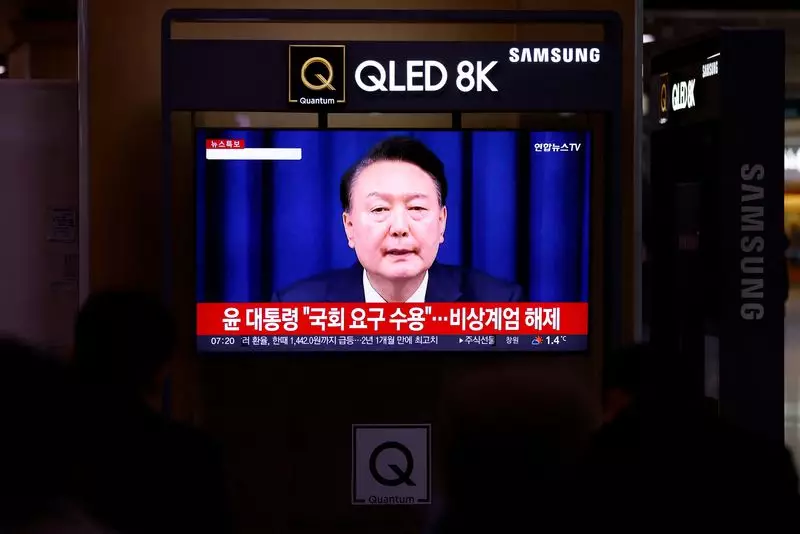The recent political upheaval in South Korea, characterized by President Yoon Suk Yeol’s sudden declaration and retraction of martial law, has sent shockwaves through the financial markets. Investors are increasingly wary as the political landscape becomes fraught with uncertainty, raising doubts about the future economic stability of the nation. This article explores the implications of the current crisis on the South Korean markets, the perspectives of financial analysts, and the broader context of investor sentiment.
The South Korean benchmark Kospi Index suffered a significant decline of nearly 2% amidst the backdrop of this political crisis. The scenario underscores how quickly political developments can reverberate through financial markets, presenting immediate challenges for investors. Market volatility escalated as the South Korean won dipped to a two-year low on Tuesday, although it managed to stabilize somewhat the following day. This turbulence reflects not only the direct impact of political events on market valuations but also the underlying concerns from investors about South Korea’s macroeconomic environment.
South Korean stocks and currency are acutely sensitive to political narratives, which are currently marked by fears of potential impeachment proceedings against President Yoon. Such concerns lead to what analysts describe as the “Korean Discount”—a perception that investing in South Korean assets carries higher risks compared to their global counterparts. This sentiment can significantly deter foreign investment, prompting market participants to pivot towards perceived safer options, such as Chinese equities.
Several financial analysts shared their insights regarding the implications of recent events. Sat Duhra, a portfolio manager at Janus Henderson in Singapore, mentioned that the political crisis is a gamble that has not yielded favorable results. Despite the market being viewed as undervalued, investor confidence is unwaveringly low due to fears of prolonged uncertainty regarding leadership and economic stability.
Daniel Tan from Grasshopper Asset Management emphasized the potential for a sustained “Korean Discount.” He highlighted that South Korean equities are trading significantly below global benchmarks, suggesting that investors will likely demand higher risk premiums when considering Korean investments. He also pointed out that essential measures like providing “unlimited liquidity” from the government and the Bank of Korea might help mitigate extensive sell-offs in the market, although the political climate would remain a significant hurdle.
Further weighing in on the situation, Robert Carnell, regional head of research at ING, noted that pre-crisis sentiment towards the won was already bearish due to weak domestic demand. He speculated that the Bank of Korea might need to pivot towards easing monetary policy to stimulate growth amidst heightened uncertainty, indicating a need for proactive measures to safeguard economic stability.
Market Stability and Future Outlook
Frances Cheung of OCBC Bank observed that while the spike in USD/KRW could be seen as an immediate reaction to the political turmoil, the overall market response appeared relatively contained. With martial law being swiftly lifted, there is a calmness that emanates from the belief that the crisis, while disruptive, may not have lasting repercussions for the market. She suggested that any FX interventions by the Bank of Korea would focus on providing liquidity to support stability.
Linda Lam from UBP took a slightly different perspective, cautioning that domestic political struggles, even if perceived as localized, could impact market sentiments. However, she maintained that the relative stability of the won would be a key factor in determining how much of a lasting impact these events would have on the stock market. Lam’s caution extended to broader emerging market equities, as potential headwinds from tariffs and currency fluctuations loom under an incoming Trump administration.
Lastly, David Chao from Invesco noted that the situation remains fluid, and that volatility could persist in the near term. However, he believed the developments would likely be a fleeting challenge, unlikely to result in significant long-term consequences for the South Korean economy and financial landscape.
The unfolding political crisis in South Korea serves as a compelling case study on how political stability, or the lack thereof, directly influences investor confidence and market dynamics. As lawmakers grapple with the reality of potential impeachment and the ramifications of President Yoon’s actions, both domestic and international investors will remain vigilant, watching closely for signs of stability or further disruption. The delicate interplay between political events and market reactions is a reminder of the intricate nature of investing in an environment where governance and economic outlook closely intertwine.

